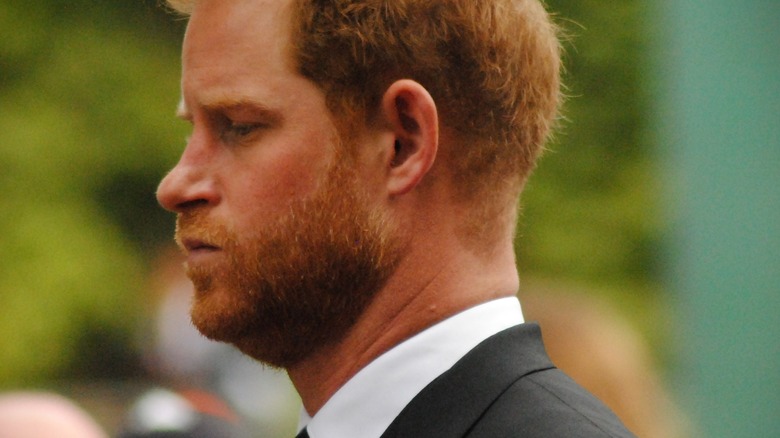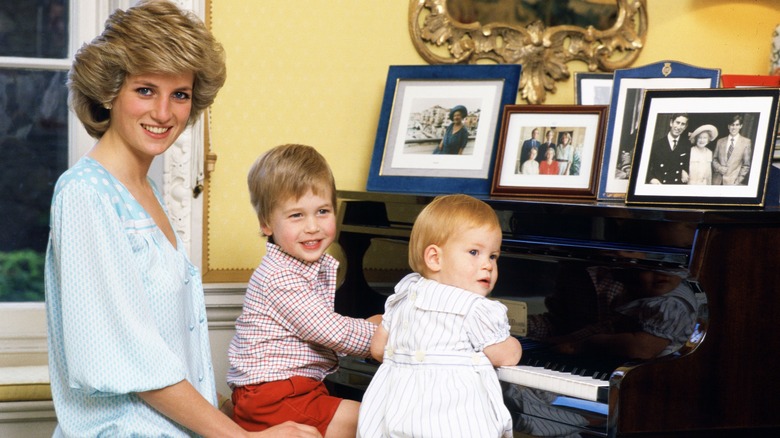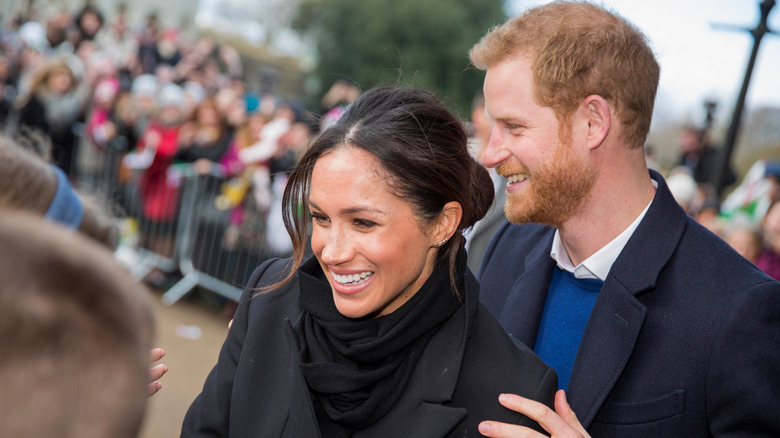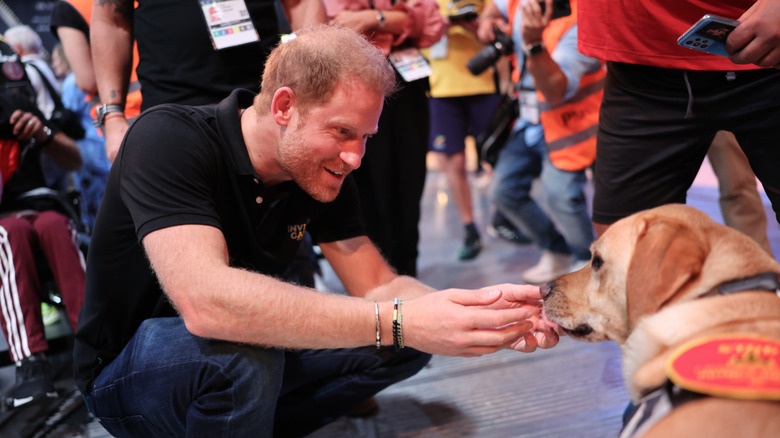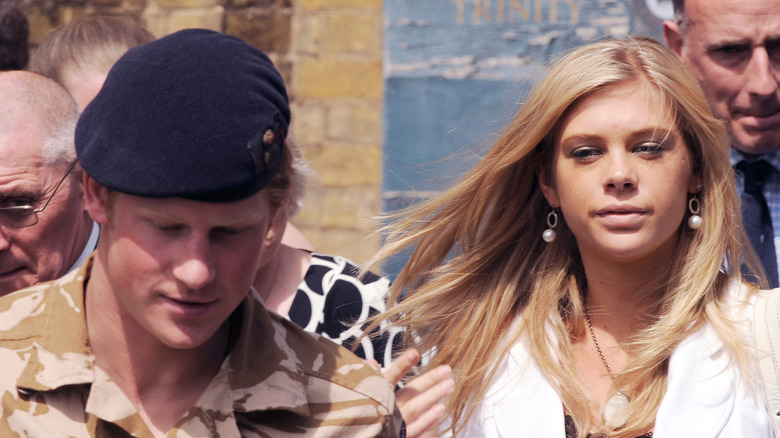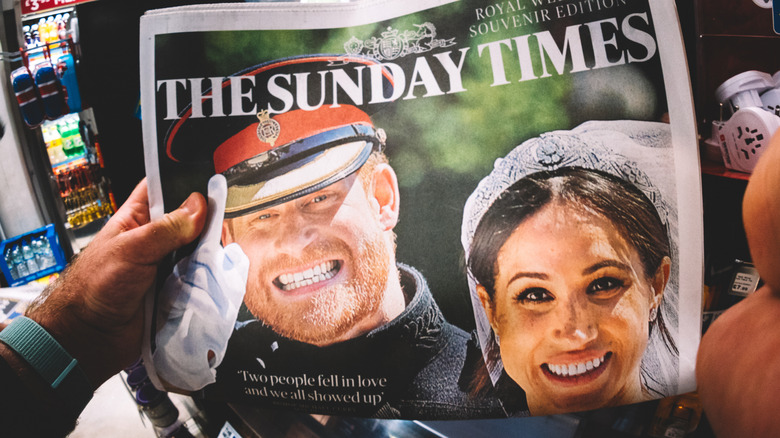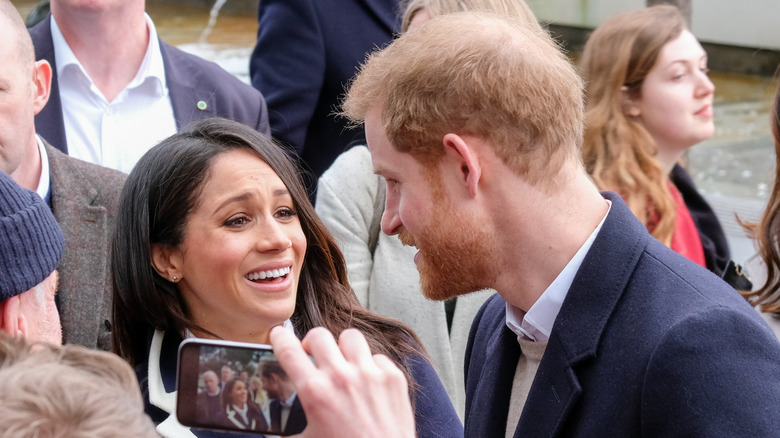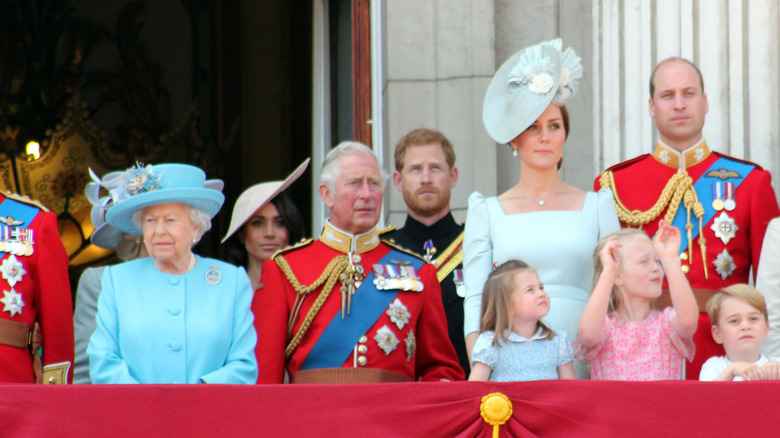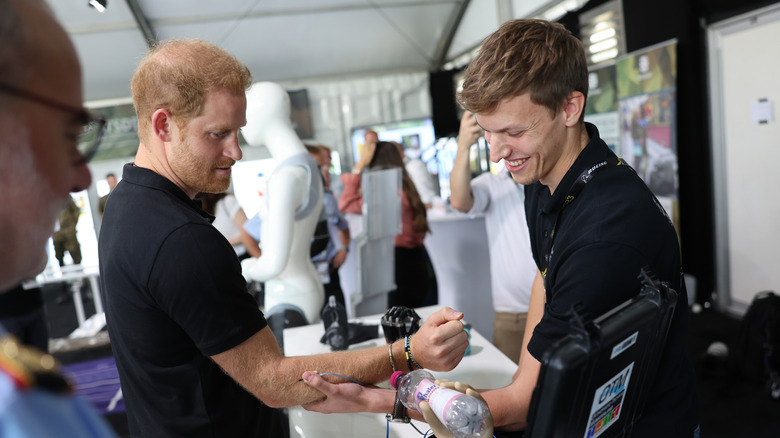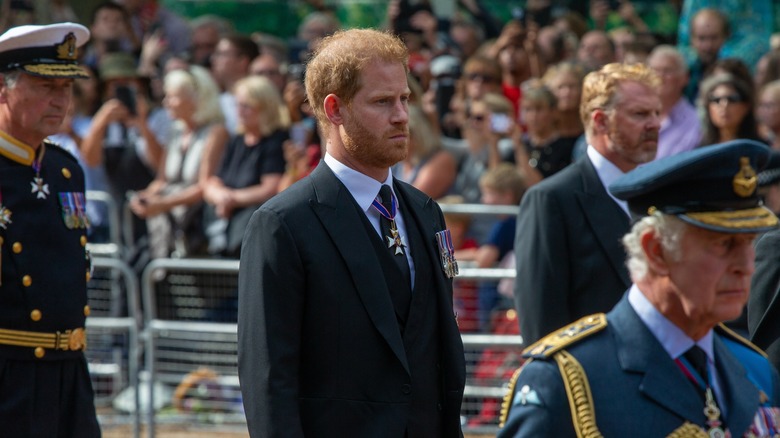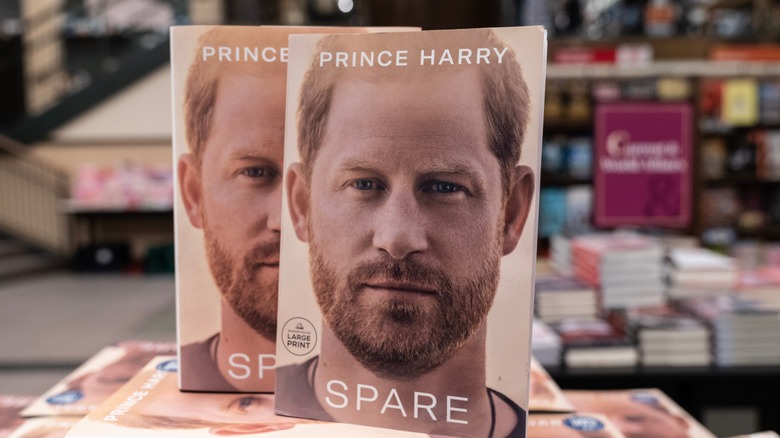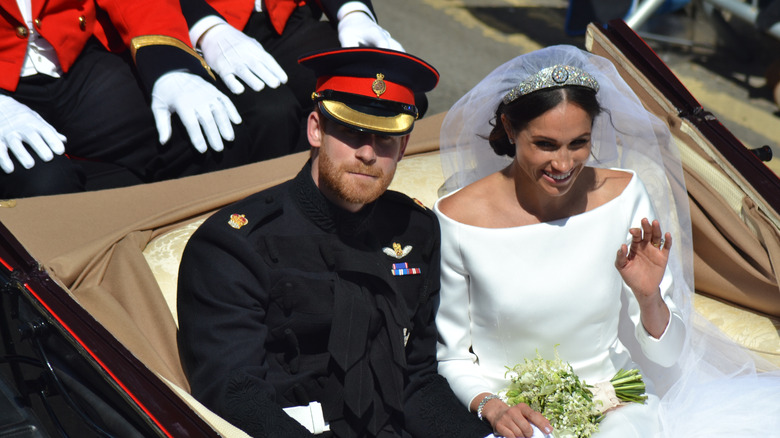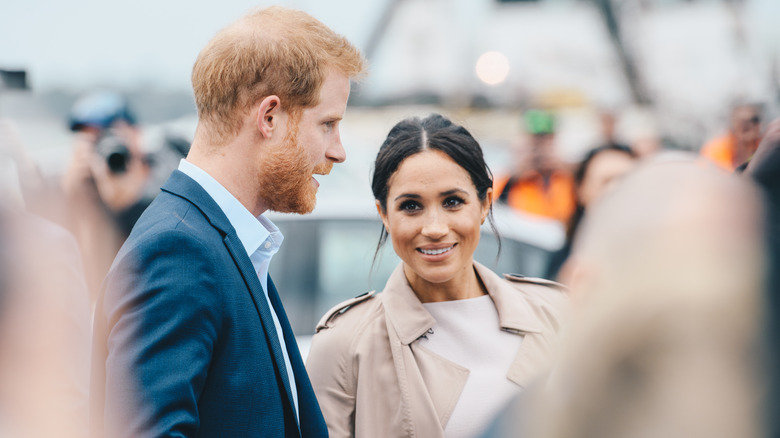Inside Prince Harry's Hateful Relationship With The Media
Prince Harry, like the rest of his family, has lived his life in a gilded cage. While he's enjoyed material riches and a luxurious lifestyle few of us could even dream of attaining, he's also had to endure a relentless onslaught of public scrutiny, both from the notoriously salacious British tabloid press and from the public at large. And if seeing himself and his family endlessly criticized and second-guessed in the tabloids and online weren't bad enough, adding to the stress was the royal tradition of politely putting up with it. Unlike the rest of us, as a member of the royal family, Harry couldn't freely clap back whenever someone trashed-talked him in a public forum.
But in recent years, as the tabloids' appetite for royal dirt intensified, some members of the royal family have started politely (but firmly) pushing back. In 2007, Prince William publicly protested the tabloid's harassment of his then-girlfriend, Princess Catherine. Following suit, Prince Harry later warned the media to leave Meghan Markle alone after their relationship became public.
His subsequent rift with the royal family only invited more media scrutiny, but the good news for him was that as a free agent no longer bound by royal etiquette constraints, he's free to push back against the media as hard and as publicly as he wants. And he hasn't hesitated to air his grievances — some of which date back decades.
His fraught relationship with the press dates back to his childhood
To a casual observer, Prince Harry appears to have had an idyllic early childhood. By his own admission, his mother, Princess Diana, was affectionate and fun-loving and did her best to offer her sons as normal a childhood as possible. Unfortunately, neither she nor then-Prince Charles could hide the rapid deterioration of their marriage from their young sons.
"We didn't understand what was going on with her and Pa, certainly, but we intuited enough, we sensed the presence of the Other Woman, because we suffered the downstream effects," Prince Harry recounted in his memoir "Spare."
Among these downstream effects was the frenzied, salacious media coverage of Charles' affair with Camilla Parker-Bowles, which no doubt stressed the already fraught royal marriage even further. Diana's tragic death in 1997 brought another onslaught of media coverage and forced Harry and his brother unwillingly into the public spotlight. While they were high-ranking royals, they were also traumatized children struggling with their mother's death — and forced to mourn on camera, a media imposition Harry still resents. "My mother had just died, and I had to walk a long way behind her coffin, surrounded by thousands of people watching me while millions more did on television," he said in a 2017 interview with Newsweek. "I don't think any child should be asked to do that, under any circumstances."
At times, the press agreed to protect him
The British press — especially its tabloids — has a well-earned reputation for relentless, often invasive coverage of its subjects. Indeed, the desire to outrace and evade a gang of paparazzi led to the car crash that took Princess Diana's life in 1997. And while Prince Harry has publicly expressed outrage about media intrusion in his personal affairs — and has been outspoken about what he considers unfair and hurtful media coverage — at times, official agreements between the royal household and the press were in place to protect Prince Harry and other royal family members from inappropriate and potentially dangerous media coverage.
Some of these agreements were intended to protect younger royals and their privacy. For instance, when Prince William studied at St. Andrews, the media agreed to back off at the royal family's request. When Harry was serving in the British military and was sent into an active combat zone, the government asked the media not to disclose his location.
But not everyone was on board. During Harry's first tour of duty, an Australian publication (which said it was unaware of the agreement with the British press) published a photo of Harry on the battlefield, a security breach that required him to cut short his tour and return home.
But for most of Prince Harry's adulthood, media coverage was unrelenting
If Prince Harry thought that leaking his location while he was in active combat was a slimy move, he had no idea of the stress media coverage would cause him in the years to come. As he recounted to the British High Court in a lawsuit against a tabloid publisher, the press eagerly try to create narratives — often spurious — around the royals.
"You're then either the 'playboy prince,' the 'failure,' the 'drop out' or, in my case, the 'thicko,' the 'cheat,' the 'underage drinker,' the 'irresponsible drug taker,' the list goes on," he wrote (via The New York Times).
He went even further in his complaints, accusing the tabloids of egging him on and coaxing him into compromising situations that would make juicy stories. But one could argue that at least some of the drama was brought on by his own poor decisions. In 2005, a scandal broke when he was photographed wearing a Nazi costume at a party, an act he recounted in his Netflix series "Harry & Meghan" as "one of the biggest mistakes of my life." In 2012, a photo of him naked at a strip poker game in Las Vegas appeared on TMZ. He later took responsibility for this too. "I probably let myself down," he told the BBC.
Prince Harry blamed the press for breaking up his previous romances
For better or worse, we tend to repeat our parents' relationship dynamics. If your parents had an open, affectionate relationship, you learned at an early age that this was how relationships were supposed to work. But if your parents had a dysfunctional marriage, you'd grow up with their problematic relationship dynamics as a baseline for your own behavior — and it takes self-awareness and work to recognize this and break that cycle.
As a high-profile member of the royal family, Prince Harry has been burdened by a form of intergenerational relationship trauma outside his control — malicious media interference in his romantic relationships. Just as his parents, then-Prince Charles and Princess Diana, had their entire relationship, including the painful deterioration of their marriage, played out in lurid detail in the tabloid press, Harry too was to find that the most personal details of his romantic relationships splashed across tabloid headlines.
For instance, he blamed tabloid journalists for his breakup with his then-girlfriend Chelsy Davy, accusing them of tapping the couple's phones, publishing sensitive personal details from their private phone conversations, and even beating them to one hotel where they'd planned a secret getaway. The pressure of all this unwanted attention was more than the couple could take, and largely because of it, they ultimately called it quits.
He proactively fought off the press when Meghan Markle entered the picture
By the time Prince Harry began dating Meghan Markle, he knew all too well how brutal press coverage of their relationship would be. He'd already seen the toll that invasive tabloid reports could have on a relationship — his heavily publicized romances with Chelsy Davy and Cressida Bonas both ended largely because of the stress of unwanted media scrutiny, and he was determined not to allow them to destroy his new relationship. While Meghan Markle was a media-savvy professional actor, Harry knew the hostile, often racist tone of many media outlets was not what she'd signed up for — and he wasn't going to let them get away with it.
Through an official statement released by his communications secretary when his relationship with Markle became public, Harry tore into the tabloids for their treatment of Markle, citing among other transgressions "the smear on the front page of a national newspaper; the racial undertones of comment pieces; and the outright sexism and racism of social media trolls and web article comments."
He cited even more troubling media behavior, including attempts to break into Markle's mother's home and attempts to bribe police to give them access. And through his communications secretary, he acknowledged this was a break from royal protocol. "He knows that it is unusual to issue a statement like this, but hopes that fair-minded people will understand why he has felt it necessary," the statement concluded.
He also blames the media for widening the rift with his family
Media pressure making Prince Harry's love life hellish was hard enough for him to take. But just as devastating to him was how the media — or more precisely, the way the royal family and the media used each other — deepened the growing rift between him and his family.
In their 2021 interview with Oprah Winfrey, Harry described an "invisible contract" between the royal household and the media, in which the royal family would grant a certain amount of (self-serving) exposure to the press while ensuring truly private matters stayed private. "There's a reason that these tabloids have holiday parties at the palace," Markle explained in the same interview (via the BBC). "They're hosted by the palace, the tabloids are. You know, there is a construct that's at play there."
This dynamic, Prince Harry told ITV, meant certain members of the royal family used the press to promote their own interests and burnish their own images, sometimes at cross purposes with his own interests. He accused unnamed family members of deciding "to get into bed with the devil" by colluding with the tabloids. "If you need to do that, or you want to do that, you choose to do that. Well, that is a choice," Harry told ITV (via Wales Online). "But the moment that that rehabilitation comes at the detriment of others, me, other members of my family, then that's where I draw the line."
He also accused his family of planting unflattering stories about him and Markle
While Prince Harry has always been irked by the media, his relationship with Meghan Markle — and her vicious treatment at the hands of the press — turned his lifelong annoyance into full-blown hatred. To add insult to injury, not only did the rest of the royal family fail to help him and Markle push back against the negative press, but according to Prince Harry, they actively contributed to it.
And in his Netflix series with Markle, "Harry & Meghan," Markle's attorney, Jenny Afia, claims to have the receipts. "I've certainly seen evidence that there was negative briefing from the palace against Harry and Meghan to suit other people's agendas," she said.
In "Harry & Meghan," Markle's friend Lucy Fraser corroborates these claims. "Meg became this scapegoat for the palace. And so they would feed stories on her, whether they were true or not to avoid other less favorable stories being printed." In another segment of the show, Harry summarized the situation: "They were happy to lie to protect my brother. They were never willing to tell the truth to protect us."
He joined forces with Elton John to sue a tabloid for phone hacking
Prince Harry had known all his life that he'd be subject to more public scrutiny than most people, and while he didn't like it, he accepted it as one of his obligations as a royal, and per an official statement from his communications secretary, sought to "develop a professional relationship with the media."
But as the public appetite for gossip grew, so did harassment by the press. And to Harry, several outlets crossed the line from aggressive investigative reporting to an unscrupulous invasion of privacy.
He wasn't the only high-profile figure to decide he'd finally had enough. In early 2023, he and a wide-ranging group of celebrities, including Elton John and his husband, actors Elizabeth Hurley and Sadie Frost, and former British Parliament member Simon Highest, joined forces in a lawsuit against Associated Newspapers Limited (ANL), the publisher of The Daily Mail and other tabloids. In the suit, the group accused ANL of hiring private investigators to track them and install bugs in their cars and homes. They also accused ANL of accessing private banking and medical information. Predictably, ANL denied any wrongdoing.
He and other celebrities sued another tabloid publisher for phone hacking
If Prince Harry had hoped to escape Britain's toxic media landscape by stepping down from his royal duties and decamping to California, he's failed miserably. Instead, he's found himself facing down British tabloids in court. At the same time he sued the publisher of The Daily Mail, he and a handful of others (including the estate of singer George Michael and soccer player and TV commentator Ian Wright) had also launched a separate lawsuit against Mirror Group Newspapers, accusing the group's newspapers, including The Mirror, of phone hacking and other illegal forms of information collection.
Specifically, he accused the Mirror Group of tapping his phones and publishing details of personal conversations (which The Mirror attributed to palace sources) with his then-girlfriend, Chelsy Davy.
"I never discussed with the palace any details about my relationship with my girlfriend," Harry told the court. And after having a couple of fairly serious relationships broken apart by media pressure, Harry said he felt it necessary to openly confront the media to, as he told the court, "somehow find a way to put the abuse, intrusion, and hate that was coming toward me and my wife to a stop."
King Charles called his media confrontations a suicide mission
Prince Harry's legal confrontations with the tabloids raised eyebrows. For royal watchers, what was most remarkable was the very fact of his filing lawsuits at all. It is exceedingly rare for British royals to appear in court: Indeed, the last royal court appearance was over a century ago, in the 1890s, when Prince Edward VII was called as a witness in a slander trial.
Just as unusual was Harry's openly confrontational stance toward the media. Officially, the royal family considers itself above either pandering to the media or defending itself against it — its traditional attitude towards media scrutiny has been "never complain, never explain." However, Harry alleges the royal family has made deals with the media in the past.
As recently as 2020, Prince William received a generous payment from a newspaper publisher as a settlement for a phone-hacking claim, according to The Guardian. But for Harry, holding the press publicly accountable is a moral obligation. "How much more blood will stain their typing fingers before someone can put a stop to this madness," he said in a written statement to the court. In his memoir "Spare," Harry recounted that while no fan of the tabloids, his father, King Charles, warned him that his battle with the press was a "suicide mission." "Maybe. But it's worth it," Harry replied.
Here's why only one journalist was allowed at Prince Harry's wedding
For the media, royal weddings are a big deal. Everything about them — from the guest list to the ceremony to the wedding dress — seems designed to generate clicks and page views. And there's no denying the public is happy to eat up all that coverage. When Prince Harry's parents, then-Prince Charles and Lady Diana Spencer, were married in 1981, a jaw-dropping 750 million people watched the ceremony on television. And even at his second, somewhat anticlimactic wedding to Camilla Parker-Bowles, the BBC alone had around 40 cameras on site.
But Harry was already over trying to be nice to the press by the time he married Meghan Markle. After his own run-ins with the tabloids and months of bad press directed at Markle, the couple decided to keep the media at arms' length at their wedding. They allowed only one journalist to view the ceremony and allowed only four cameras outside.
They had legitimate official reasons for a lower-profile ceremony — because he wasn't a direct heir to the throne, his wedding was less of a big deal than that of his father or older brother. Unofficially, though, some saw it as a quiet middle finger to the media. "The chance of leaving journalists out in the street for the royal wedding is a gift for him," Duncan Larcombe, royal editor at The Sun, told Town & Country.
Prince Harry feels exploited by the press – but he's using them too
Prince Harry has made no secret of his disdain for the media. And his beef goes back a long way. He considers the media responsible for the death of his mother, Princess Diana, and most would agree — she died tragically young in a car crash as her chauffeur tried to outmaneuver a gang of paparazzi.
After stepping down from his official royal duties — in part because of the stress of negative media coverage of him and his wife, Meghan Markle — he became even more vocal in his criticism of the press. Indeed, much of his post-royal life has been dedicated to airing his grievances against the media and his family's collusion with the press, through his Netflix series with Markle, "Harry & Meghan," his memoir, "Spare," and numerous TV interviews.
Astute observers couldn't help noticing how Prince Harry was making his grievances with the press known — through the media itself. And while some critics have noted the hypocrisy of a guy getting paid millions of dollars by media outlets to complain about how unfairly he's been treated by the media, others have pointed out that Prince Harry's recent media blitz may be inadvertently drawing readers and viewers to the outlets he's denounced. For instance, when "Harry & Meghan" debuted, the British tabloids The Sun and The Daily Mail ran stories on the couple, many among the publications' top stories at the time.
